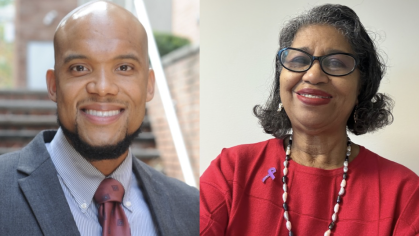April is Autism Awareness Month. Dr. Tawanda L. Hubbard, Associate Professor of Professional Practice at Rutgers School of Social Work, explains what this month means to her and shares ideas for social workers to support individuals and families living with autism.
Tell us a bit about your journey to social work.
My journey to social work has been personal. It has been filled with challenges and barriers to overcome, hurts to heal, and triumphs to savor. As a social work educator and practitioner, I view my work as a calling to be part of the solution in the lives of those I work with and support and the communities I serve. Being a Black African American woman, I have encountered gendered racism and the stigma that accompanies it. Challenging stigma and advocating for justice, inclusion, and liberation for all is sometimes difficult but necessary. Embracing that humans are not monolithic, diversity is at the core of human experience. James Baldwin said it this way, “the world is before you, and you need not take it or leave it as it was when you came in.”
What is the significance of Autism Awareness Month for you?
As a Black African American female social worker who works with diverse individuals and families across different communities, I value neurodiversity and see it as a part of normal human experience and expression. Autism Awareness Month is significant to me because it provides a space and opportunity for concerted efforts to reduce autism stigma, which negatively impacts the well-being of individuals and families living with autism. Autism Awareness Month is a dedicated time when the spotlight is drawn on the wealth of knowledge that exists to educate the public on what autism is and what it is not and to promote greater advocacy, acceptance, and support that fosters inclusion and belonging for individuals and families living with autism.
How can the social work community recognize and commemorate Autism Awareness Month?
Social workers are committed to enhancing human well-being, helping to relieve people’s suffering, fighting for social justice, and improving lives and communities. Social workers focus both on the person and their environment, and we recognize external factors that impact a person’s situation, outlook, and quality of life. Social workers understand the important role of public awareness in changing attitudes, practices, and policies. The social work community can do what we do every day: collaborate, support, and advocate. We can join our fellow social workers who support individuals and families living with autism to bring attention to the public about their needs, challenges, and strengths, advocate for greater opportunities and quality services and support, and reduce autism stigma through countering stereotypes and misinformation about persons with autism to foster inclusion and diversity.
What can the social work profession or social workers do to continue to support the importance for individuals for Autism Awareness Month beyond this month?
Social workers are in almost every industry on the frontlines and behind the scenes in leadership roles. We are positioned to advocate with and on behalf of individuals and families living with autism to do work that supports their inclusion: educate the public about autism to reduce stigma; inform public policy; develop services that create more autism-friendly spaces and supportive and accessible assistance; reinforce positive representations of autistic people in the media; and promote inclusion and acceptance of neurodiversity as part of diverse ways of being that are part of normal human experience.
This story was created in partnership with Rutgers School of Social Work's Inclusion, Intersectionality, Diversity, Equity, and Advancement (IIDEA) Committee.



